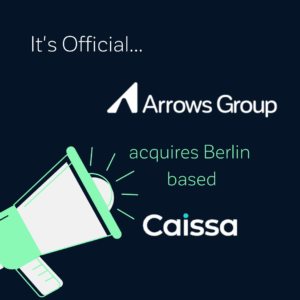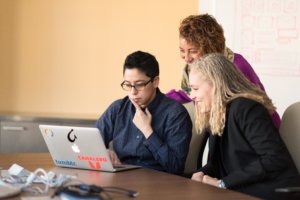In autumn 2021, we proudly announced to the world that Berlin-based Caissa Recruitment had joined the Arrows Group Global family.
In the first of our ‘Who We Are’ series, join us in conversation with Caissa Recruitment’s Founder, Konstanty Sliwowski. From the critical responsibility of recruitment to proud feminism and extreme ownership, discover his thoughts on work, life and the best things about living in Berlin.
–
Welcome, Konstanty. Can you kick off by telling us a little bit about your background and the path that led to you founding Caissa Recruitment in 2009?

My academic background is in history and politics. I studied at Oxford and after university, I worked for an NGO tasked with restructuring local governance in Iraq. It sounds very interesting, but it also exposed me to the realities of how slow this work can be. I wanted to make an impact more quickly.
Luckily, the owner of an Austrian executive search firm took me under his wing. This sparked a genuine interest. I am one of the few who has chosen headhunting and not fallen into it!
By 2009, I’d spent several years working for recruitment companies as well as in executive search and had built teams. The time felt right to go out on my own. I started Caissa Recruitment from my kitchen table in London, offering staffing solutions for engineering roles. Those were the early humble beginnings, when all I had was my belief that I could do it better than anyone else.
The connection between Caissa and Berlin started early on. Many of my first clients were based there; people I had built relationships with over my career. There became a clear need for Caissa to have a permanent base in Berlin. We opened an office there in 2015 and I relocated in early 2017 with my family. In 2018, we closed our London office to fully focus on Berlin.
Why the engineering sector?
We focus on engineering and product, which I see as the sharp end of the spear when it comes to innovation.
Most of the companies we work with are VC backed and at advanced stages. I love working with companies that are building the future and new solutions, innovating and being fast, breaking things, pivoting and adapting to the market. As for being close to the product and engineering side – well, that’s the fun part of the business, isn’t it?!
How did the partnership with Arrows Group Global come about?

There’s very little in the form of alliances between companies in recruitment. I was always open to having conversations with companies where there were synergies.
A mutual contact introduced Caissa and Arrows. We found a lot of similarities in terms of values, how we operate and a vision for how recruitment can be improved. We spent more than a year in discussions before making it official.
Now we have announced the partnership, it’s very exciting. It’s still early days, so the integrations and how we function are still being processed.
Read about the partnership of Arrows Group and Caissa here.
For Arrows Group or Caissa clients and candidates, how will they experience the partnership / how will it impact them?
Caissa will remain a separate brand under Arrows, with our distinct feel, culture, and way of doing things. One benefit for all candidates and clients is the access to additional services, information and wider data that we are working on pooling together. As a group, we can provide our clients with more insights and opportunities than they had before.
From the business to you personally. What should people know about you and what makes you tick?
I’m a third-culture kid. Born in Poland, I’ve since lived in Vienna, Moscow, London, Berlin, Oxford, and some time in Mexico. I was raised by Polish parents, going to American schools receiving Anglo-Saxon education, and speaking four languages. Adding to that mix, my wife is half-German, born in Hong Kong and our children are a mix of all the above. This makes for a fun setup!
“What you can learn from conversations, even when you disagree, is an artform I hope is not lost in this day and age.”
I have a lot of appreciation for different cultures, religions, and perspectives. What makes the world interesting is that there are multiple ways of looking at things. What you can learn from conversations, even when you disagree, is an artform I hope is not lost in this day and age.
Being with my family and showing the world to my kids is important. I travel mainly for food and photography and enjoy exploring. It doesn’t need to be 5* hotels. We like to show the world as it is.
How do you translate your feminist principles into your professional life?
 I’m a proud feminist. There are a lot of strong women in my life, including my daughter who is turning eight soon. I want to make sure her world is better than the one I grew up in, with more equality, opportunities, and space for her to be who she wants.
I’m a proud feminist. There are a lot of strong women in my life, including my daughter who is turning eight soon. I want to make sure her world is better than the one I grew up in, with more equality, opportunities, and space for her to be who she wants.
I believe in hiring the right person for the job, regardless of anything else. It so happens Caissa Recruitment is predominantly female, and I love that. I get to work with amazing women and men.
The engineering sector is an interesting one. Companies should be thinking about how they can develop engineers internally to support their diversity ambitions, not headhunting from one another. About 17% of engineering graduates in Europe are female. With that in mind, how can companies possibly have a 50:50 gender split? There are not enough graduates to enable it. It’s a grassroots challenge.
You are very upfront about the shortcomings of recruitment, describing your approach as challenging the status quo. Where do you think the traditional recruitment process goes wrong?
Recruitment has traditionally been very transactional. As recruiters, we have a big responsibility for people’s careers, growth, and prosperity – including that of their families. We need to take this seriously. We’re not just selling a doodad!
This problem has a historical context. In the 1940’s/50’s, executive search developed from strategy consultants. They would help companies with their strategy and then suggest the best person to lead it. At the same time, job centres were there to fill positions in factories, hospitals and large blue-collar organisations. Then came the question of who’s going to manage the factory or hospital.
Executive search firms didn’t want to touch that middle level of management. So, it was the job centres who filled the gap. This is where things went wrong, and we still see perpetuated to this day. This transactional mindset focuses on ‘bums on seats’, time on the phone, number of CVs sent out, etc. This dilutes the value we can bring as recruiters and what we can do for people.
If we do our job right, we have an incredible view of what is happening in the job market. We can see where shortages will be, what salary and employment trends will be – such as hybrid working – and inform our clients and candidates. We can be mentors/coaches, supporting our candidates’ growth trajectories.
How do you do things differently?
It doesn’t matter what type of company you are; it is your people that make you. No other function functions without them. How you hire, how you engage with the candidate market, how you treat your employees, how you are able to create career paths, how you ultimately retain the right people – this has the biggest single impact on your business.
This is why recruitment matters and is such a critical job in an organization.
It is also why we share information with our clients and candidates that we observe from the market. We do annual surveys on how candidates perceive being hired and salary surveys based on actual offers. This means we can advise companies on the sort of benefits that will land with their hires. People don’t want ping pong tables or free fruit anymore. That’s not what it’s about.
We work with our clients to create the best employment proposition for their candidates.
You mentioned your annual surveys, which Caissa Recruitment has run for the last five years. What are some of the biggest changes you’ve seen in this time?
The number one motivator for people to change jobs is still money. When we started running our surveys, over 80% put money as their number one reason to change. This year, while it is still number one, less than 50% of respondents put it top.
“[Candidates] are now asking “how does the job fit around me,” not “how do I fit around the job.”
Zooming up behind money is flexibility of work. It’s by far the next biggest reason. People have certain expectations of what flexibility is. They are now asking “how does the job fit around me” not “how do I fit around the job.”
Has flexibility become an expected norm?
It’s not yet the norm that companies offer. But candidates expect it. This is the Grand Canyon of hiring; it’s a huge divide.
Companies are debating how many days people will go back to the office for. Two? Three? How about instead asking what people want, then supporting them to ensure they are able to deliver on their work obligations.
There are some Caissa team members I have never met in person. It works for them. I’d like to meet them for a beer, or lunch, but I don’t need them to sit next to me in an office to make sure I can look over their shoulder. They’re adults. It is time employers embrace the fact they have employed adults.
How people own their work is what distinguishes them as good or bad employees. The definition of ‘extreme ownership’ is that you own everything that impacts you. It’s not about waiting for someone to get back to you. It’s about taking ownership of why that person is not getting back to you.
Companies will miss out on the best hires if they are not flexible. The negotiation used to be on salary and days holiday. Now we are seeing people ask; “what’s my flexibility?”
People are asking what time they are being given. Time is an unrelenting currency. You can always get more money. Time, you’re not going to get back. It has become a serious bargaining chip.
“People are asking what time they are being given. Time is an unrelenting currency. You can always get more money.”
For companies, this is difficult to figure out. There is a set-up for when everyone works in the office, or for when fully remote. But a hybrid workplace is the most difficult because there are so many variables. How do you build a framework which, by definition, is inflexible to accommodate for the flexible employment the market demands?
What do you think is driving “The Great Resignation”?
The Great Resignation is multi-faceted. There are more jobs right now. People’s priorities have also changed or been seriously readjusted. Some people have moved from cities into the countryside. They want a company that will, say, allow them to surf at 5am before work. Two years ago, this would not have even been a conversation.
This new way of working is not better for all, though. Some people – like me – need a dedicated space for office vs home life. The point is, there should be room for all.
At Caissa Recruitment you have a 90% offer acceptance rate, way above the industry average (of around 65%). Why do you think that is?
Any hiring process is a relationship-building exercise. A good relationship needs to be relatively equally balanced.
An interview is as much an opportunity for a candidate to interview a company as it is for a company to interview a candidate. The ‘product’ here is as much the company’s position, job, values, and mission as it is the candidate’s skillset and experience. These things need to match up.
We work on creating valuable interactions and relationships. We ensure both sides have all the information they need to make the best decision. There’s never a ‘perfect’ match. You need to ensure there’s enough flexibility on both sides to make it work.
“We work on creating valuable interactions and relationships. We ensure both sides have all the information they need to make the best decision.”
From relationship-building to personal inspiration. Who or what inspires you most?
I read a lot and listen to a lot of audiobooks. I seek inspiration in daily life, through the people I talk to. I believe there’s something to be learnt from every conversation.
I’m often inspired by what my kids say! Sometimes asking your kids to help with difficult problems is the best solution you can get.
All the knowledge you need is already out there. It’s about opening yourself up to it and being able to embrace it – and having the confidence to admit that sometimes your perspective is wrong.
And finally, what are your insider tips on the best things to do/see in Berlin?
 Come talk to me if you’re ever visiting!
Come talk to me if you’re ever visiting!
Berlin is a wonderful city, with very distinct neighbourhoods. You can find anything you want: crazy parties, outstanding dining, superb art from galleries to street art, amazing coffee, very good wine bars. Berlin was a divided city, but the result is that it’s got almost two of everything. Two opera houses. Two philharmonics. You have access to all of that.
If you go to a party, you will invariably find a founder, an engineer, an opera singer, an artist, a world traveller who pops in. You will be exposed to a richness of conversation in a melting pot of the world. It is that eclectic mix that makes the city what it is.